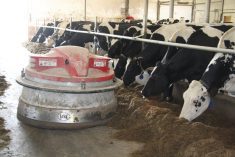STRATHMORE, Alta. – Most people who gave blood in the past won’t see any difference in giving to a new collection agency.
That’s how Canadian Blood Services wants it.
In rural areas turnout is always good when mobile clinics visit once every eight weeks.
“The clinics so far have exceeded our targets,” said Anna Gordon, assistant mobile clinic co-ordinator in Alberta.
Berta Walter from Hussar, Alta., came to make her sixth donation of blood at Strathmore because, “I enjoy it and it’s a good service.”
Read Also

Manitoba extends Crown land rent freeze
Manitoba government links the continued rental rate freeze on grazing and forage leases to economic and environmental challenges facing the industry
As a member of a Hutterite colony, she also helped make dozens of rich squares for donors to eat after donating a pint.
“The Hutterites are probably our best supporters,” said mobile clinic co-ordinator Trudy Feldmeyer.
Following the Sept. 28 transfer from the Red Cross to the national and independent Canadian Blood Services, it was business as usual for the 18-member staff clinic that travels Alberta from Medicine Hat to Olds.
The mobile clinic is in the country two to three days a week.
To make sure people turn out, staff in prairie offices like Calgary or Regina monitor crop reports. It’s a guaranteed poor turnout if they miscalculate and the clinic is held during seeding or harvest, said Feldmeyer.
While the mobile clinics also travel from Calgary to Lethbridge to Medicine Hat where they collect blood at two or three-day clinics, some services need to be done at the agency’s office. Platelet donations, for instance, must still be made at Red Cross House in Calgary.
In addition, the agency is considering offering appointment times to donors who find it difficult to come during set hours because of work schedules.
The faithful who donate regularly will still get their pins starting at five times and the number of donations given to the Red Cross will be included by the new agency.
Youths may start donating at age 17 and must weigh more than 110 pounds.
To ensure collected blood is safe there are stringent testing procedures. The agency also co-ordinates the manufacture of blood into component and derivative products, buys blood substitutes and alternatives when necessary and distributes blood and blood products to hospitals.















